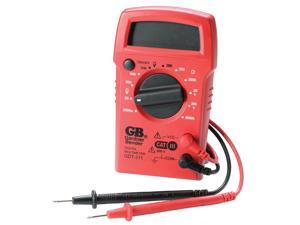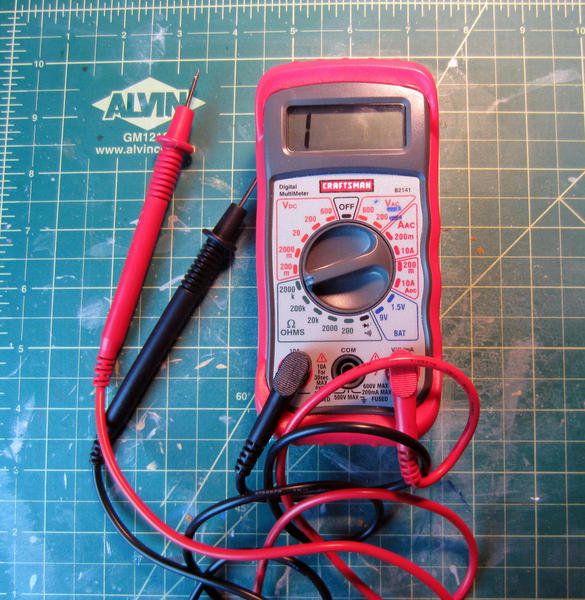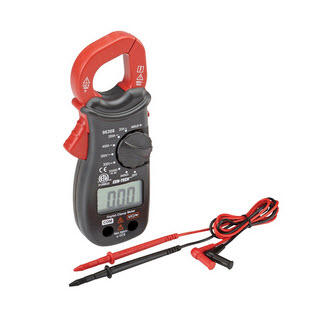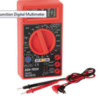looking at getting one. what do you have?
Replies sorted oldest to newest
Although some will scoff at this suggestion, I bought one of these to replace my aging portable Fluke that was starting to have issues. I'm quite happy with the performance and accuracy of this meter, especially for the price. It also offers a lot of features you won't find on some other meters, temperature and capacitance are two. It is a True-RMS meter and tracks very closely to my bench Fluke.
MASTECH MS8226 RS232 Auto Ranging Digital Multimeter DMM Cap Freq Temp Tester
Attachments
I have been eyeing either a Fluke 179 or any one of the Fluke 115, 116, 117's. Been wanting one of these since I retired. Had a 179 at work.
The one gunrunnerjohn posted looks pretty good for much less $$$. I have a Radio Shack TRMS that looks similar to it and was (I think) similar in price. Mine is lacking a few of the Mastech's features like temp and maybe capacitance. Mastech Looks like a good one to me.
Hi - Bob • I use a Craftsman Multi Meter, Check volts, ohms and electrical continuity. This is what works for my layout.
Click photo to enlarge
Attachments
Fluke 789 process meter
B&K Precision Multimeter, price range $50.00 to $70.00, have two, one approximately 15 years old, no issue with this meter, purchased another BK autoranging meter two years ago.
I have a Velleman 850BL (purchased from OGR) for use on the layout and a Fluke 73 which I use on the workbench.
I use a Simpson 260 analog meter for most things.
Once in a while I think about picking up a Fluke DMM, perhaps a 113. I cannot justify the cost in my mind.
I use a Simpson 260 analog meter for most things.
Once in a while I think about picking up a Fluke DMM, perhaps a 113. I cannot justify the cost in my mind.
Exactly, which is why the Mastech is an excellent option. Doe's everything a Fluke 179 does.
These small meters do a good job of measuring volts and ohms. Current flow, Amps can be troublesome.
Requires a series connection of the meter in the circuit, and there are protection fuses in the meter that may blow.
Amperage, may be best measured, with a clamp meter.
![]() Antique analog meter that still does a good job pictured.
Antique analog meter that still does a good job pictured.![]()

There are multi-meters that include the clamp/amp feature. Link is to Sears/Craftsman.
Noted Christmas story. I found an old analog multi-meter at a trainshow for next to nothing. Replaced the battery and it worked. Gave it to my Grandson for Christmas. ![]()
Developing issues is: How do you read the scales, or for that matter how do you use a small meter (analog) like this??? A training session has been scheduled. ![]()
I've had the Mastertech about 6 months, and it's in use every day, so far it's been great. For AC amperage readings, I use the $10 Harbor Freight clamp-on digital mini-meter, it's quite accurate according to my bench Fluke meter, and the price is right. It's very handy to toss in the toolbox and go on the road, it has basic voltage and resistance ranges as well. Nine times out of ten, I'm using the clamp-on function for current.
Harbor Freight Digital Clamp-On Meter
Attachments
The little Harbor Freight clamp meter is quite nice, I also have one that's maybe 3 years old or so and still works great. Small and fits well in your hand, comfortable. Price has gone up a little, but still a good buy.
I also have a larger DMM, also from HF that has temp, but it's not TRMS, the big red one they have. It has a nice big read out that I can easily see and the screen tilts up and down. Got that with one of their coupons, forget the final cost though, maybe $15 or so? I also have several of HF's little DMM's that are either free with purchase or anywhere from $1-$3 on sale. Got those stashed all over the basement, one is always handy. Must be something about that Free-$3 price range at Harbor Freight that gets my attention. Maybe they have my number?
I have two or three of the little free ones, if I'm in there and it's free, I take it. ![]() Like you, I just keep them around in places I might need a meter.
Like you, I just keep them around in places I might need a meter.
Don't waste our money on the expensive meters, the freebie from HF works great.
I brought mine to work and checked it against our certified meters and the HF one was dead on.
Don't waste our money on the expensive meters, the freebie from HF works great.
I brought mine to work and checked it against our certified meters and the HF one was dead on.
Even at low resistance? Mine starts off at about .3ohms. Not worth when some items need to be read at .03ohms. But certainly good enough for go no go. Maybe I just got a bad one. I also have a Sears one and worked fine, until recently. The dial is not making good contact on the ohm setting anymore. G
GGG: How low do you need to go for model trains?
Fluke gives the resolution on a 113 as being .1 ohm.
The reason I was thinking about getting a Fluke 113 was to identify armatures by their resistance, and comparing them to what is published in Bob Hannon's books.
According to the material in the books, some Postwar Lionel armatures look alike (or at least they are very similar) but vary in their resistance. He gives the resistance down to a tenth of an ohm.
I do have a Fluke 87 multi-meter Most interesting story that I can remember, foggy head. I had a service call to a local line contractor, who I had done work for. They had installed a new generator/alternator in one of their telephone line trucks, complete with control center, a step up from what the truck had. It wouldn't work, they had checked everything. Service manual said to check frequency. The Fluke 87 can check frequency, sure enough 45 hz, wasn't going to work. Power take off driven, they increased the mechanical speed of the generator/alternator until the Fluke read 60hz. At that point the control system was happy/all the electric on the line truck worked. More complex meters do have a purpose. ![]()

GGG: How low do you need to go for model trains?
Fluke gives the resolution on a 113 as being .1 ohm.
The reason I was thinking about getting a Fluke 113 was to identify armatures by their resistance, and comparing them to what is published in Bob Hannon's books.
According to the material in the books, some Postwar Lionel armatures look alike (or at least they are very similar) but vary in their resistance. He gives the resistance down to a tenth of an ohm.
CW, One SMD resistor of importance on a PS-2 board is .03. The problem with the free one I have is the leads don't seat well. So I would not use it as a daily user. But for some one to do a some basic test like battery voltage, basic continuity it is fine. If I was measuring continuity through a harness on a MTH engine and got a 3 ohm resistance, I would be looking for the problem. Yet if I connected my meter I would get 0 Ohms or .1. Big difference in knowing the connection is good, vice having a high resistance issue some where (solder joint). Force unnecessary work. Maybe I got a bad one, but right now it sits in my garage by the vice and grinder![]() G
G
For really low resistance, I use my Fluke bench meter, it has a 2 ohm full scale range. Once you zero it, you can get really close. The Mastertech is pretty good with low resistance, but clearly not like the Fluke on the bench.
And yes, the Mastertech does have a frequency measurement capability. ![]()
Although some will scoff at this suggestion, I bought one of these to replace my aging portable Fluke that was starting to have issues. I'm quite happy with the performance and accuracy of this meter, especially for the price. It also offers a lot of features you won't find on some other meters, temperature and capacitance are two. It is a True-RMS meter and tracks very closely to my bench Fluke.
MASTECH MS8226 RS232 Auto Ranging Digital Multimeter DMM Cap Freq Temp Tester
Gunrunnerjohn,
Is this a true RMS voltage tester that I can use to test the voltage out of my ZW-L and on my tracks??
Thanks,
RickM46
Yep, I've been using it as my regular portable meter for some time now, and I'm very happy with it. It is true RMS measurement, and beside all the usual functions it also has capacitance, temperature, and frequency measurements. The continuity beeper is nice and loud, and it comes with a nice rubber protective case. If you're really recording stuff, it even has an RS232 interface, though I've never tried it.
I use the Gardener Bender GT-311. Works well.

For a basic meter, all you need is this frequently free one from Harbor Freight. I have several around in various locations, the price is right... ![]()
Click on the graphic for a link to the product.
Attachments
Nope, the cheap meters just do an average measurement for non-sinusoidal waveforms.
For a basic meter, all you need is this frequently free one from Harbor Freight. I have several around in various locations, the price is right... ![]()
Click on the graphic for a link to the product.
Thanks!!
I will be heading toward the Mastech.
I have also consulted via email with my EE Nephew who works for Intel developing computer chips and am awaiting a response.
Will keep the forum up on what I choose.
RickM46
And now it starts.
Gunrunner,
A few years ago my children bought a Mastertech as a gift. Whenever one comes to visit I unpack my late 50's vintage, RS Heath Kit Analog. Drives them wild.. I sure had fun building it way back when.
I agree that the cheaper meters don't read low ohms well.
An analog meter has one advantage: if you need to detect a quick burst of power, that cuts off before the digital can display a reading. The meter needle quivers. I keep an old one around just in case I have such a need. Also helpful if the digital keeps displaying a range of numbers.
The cheap Harbor Freights have a battery tester which is quite good.
A digital meter with an audible sounder is great for checking continuity.
The Fluke 7x series has a rapid response bar graph at the bottom of the screen that is good for what you are talking about, it reacts like an analog meter.
Gunrunner,
A few years ago my children bought a Mastertech as a gift. Whenever one comes to visit I unpack my late 50's vintage, RS Heath Kit Analog. Drives them wild.. I sure had fun building it way back when.
I had the Heathkit VTVM way back then, it was the bee's knees at the time. ![]()
I have a Fluke 77 for general use. I also keep a H F one in the train room.
I have a Fluke 77, but over the many years of faithful service, it's drifted out of calibration. I looked and the calibration procedure doesn't address the scale that's the worst, that's the ohms. As I do a lot of stuff that I'd like accurate low value resistance readings, that was the killer. No zero capability, so it's "retired" and I'm using the excellent MASTECH MS8226, and I'm quite happy with it's performance.
The quality and price of a Fluke is beyond what the ordinary RR modeler really needs. While a tech may need the precision, for the average modeler it is not.
The "bee's knees?" GRJ, come on, you're not that old!
The "bee's knees?" GRJ, come on, you're not that old!
You might be surprised. ![]()
RJR,
The Harbor Freight one Guns pictured works well, and the price is definitely right, the hook clamp really does work, I actually need to pick up another one, next time I am in the HF store.
PCRR/Dave
I have seen it, note that they don't specify what calibration costs, and I'm sure the amount has three figures! I can buy three or four of the excellent Mastertech meters as I need them for the price of one calibration at Fluke. I really don't think it's cost effective to calibrate most multimeters.
Sent for the Mastech from here:
MASTECH MS8226 RS232 Auto Ranging Digital Multimeter DMM Cap Freq Temp Tester
Thanks GRJ.
Well, I'm confused and I am not an electrical guy.
My Mastech showed up today (took 3 weeks from China) from here:
MASTECH MS8226 RS232 Auto Ranging Digital Multimeter DMM Cap Freq Temp Tester
This one is not branded as a True RMS meter.
I also got a Tekpower True RMS meter a few weeks ago (took 2 days from Amazon) from here:
http://www.amazon.com/Tekpower...r+digital+multimeter
There are differences between readings of the two when testing the A poles on my ZW-L:
With the A lever set at: Tekpower reading: Mastech reading:
.......... 16v 16.01 ..................... 13.17
........ 18v 17.24 .................... 15.27
........... 20v 17.87 .................... 16.22
So, are the differences because one meter is true RMS and one not?
RickM46










